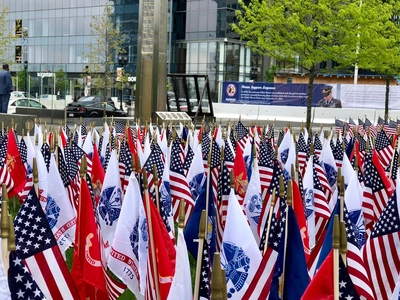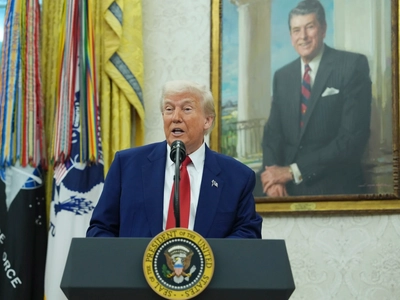City Orders Restaurant Owner to Remove Flags Honoring Fallen Heroes—His Response Shocks Everyone
Johnny Brann never imagined that displaying flags to honor fallen heroes would spark a legal battle that would change Michigan law forever. But when the City of Grand Rapids told him to take down the memorial flags adorning his steakhouse, the restaurant owner's defiant response ignited a firestorm that divided his community and ultimately reached the state legislature.
"Those flags are staying on the building, they are not coming down," Brann declared when city officials came knocking. "It's about supporting the military and law enforcement."
What happened next exposes the troubling reality of how bureaucratic red tape can trample on our most sacred traditions—and how one man's refusal to back down became a rallying cry for patriotic Americans everywhere.
The Flags That Started It All
For over five years, Brann's Steakhouse on Leonard Street in Grand Rapids displayed memorial flags honoring fallen police officers and military members. These weren't just decorations—they were a sacred tribute to heroes who made the ultimate sacrifice for our freedom and safety.
Each flag represented a story of courage, a family torn apart by loss, and a community's gratitude for those who serve. To Johnny Brann, removing them wasn't just about following city code—it was about abandoning the very values that make America great.
But in 2018, the Grand Rapids Planning Department received a complaint about "excessive signage" on the restaurant building. City officials determined that the memorial flags violated local zoning ordinances and issued an enforcement letter demanding their removal.
A Community Divided
The city's stance was clear: this wasn't about the content of the flags, but about following established zoning rules. Local officials insisted they were simply enforcing ordinances that apply to all businesses equally.
But for Brann and thousands of supporters, this felt like something much darker—a bureaucratic assault on patriotic expression and the honoring of fallen heroes.
"It has nothing to do with the content," city leaders maintained, claiming they were bound by existing zoning laws regardless of the flags' meaning.
Tell that to the families of fallen officers and soldiers who saw these displays as one of the few public acknowledgments of their loved ones' sacrifice.
The Battle Lines Are Drawn
As news of the controversy spread, supporters rallied around Brann's Steakhouse. Patriots, veterans, and law enforcement officers gathered to show their support for the restaurant owner's stand.
The story struck a nerve across America, tapping into deeper frustrations about government overreach and the erosion of patriotic traditions. Social media exploded with support for Brann, with thousands sharing his story and condemning the city's actions.
"Well done the owner," wrote one supporter, echoing the sentiments of countless Americans who saw this as a crucial test of our values.
But the city wouldn't budge. Despite the mounting pressure and public outcry, officials maintained their position that the flags had to go.
One Man's Stand Changes Everything
Johnny Brann could have quietly complied. He could have taken down the flags and avoided the legal battle, the media attention, and the controversy.
Instead, he chose to fight—not just for his restaurant, but for every American who believes that honoring our heroes should never be subject to bureaucratic whims.
The battle wasn't just about flags anymore. It became a symbol of the clash between individual conscience and government authority, between honoring tradition and following rules, between doing what's right and doing what's legal.
Victory Through Persistence
Brann's determination paid off in ways he never could have imagined. The controversy caught the attention of Michigan state legislators, who recognized that something fundamental was at stake.
In December 2018, the Michigan legislature passed a new law specifically protecting displays that honor fallen military members and police officers. Governor Rick Snyder signed the legislation on December 27, making it legal for businesses to display such memorials regardless of local zoning ordinances.
"I'm happy to say that it's over," Brann said after the law's passage. "We're hoping that now that it's legal in the state of Michigan, other people will do the same thing."
The new law didn't just protect Brann's flags—it created a precedent that would safeguard similar displays across the entire state.
The Bigger Picture
This story reveals something troubling about the state of our society. When honoring fallen heroes becomes a legal battle, when remembering sacrifice becomes a zoning violation, we've lost sight of what truly matters.
Brann's fight wasn't just about his restaurant—it was about preserving the right to publicly honor those who gave everything for our freedom. It was about rejecting the idea that bureaucratic convenience should override moral obligation.
The fact that it took a change in state law to protect something as fundamental as honoring fallen heroes exposes how far we've drifted from our core values.
A Legacy of Courage
Today, the flags still fly at Brann's Steakhouse, protected by the very law that their display helped create. But their significance extends far beyond a single restaurant.
They stand as a reminder that sometimes doing what's right requires standing up to authority. They prove that one person's conviction can change the law and protect the rights of countless others.
Johnny Brann's refusal to remove those flags sent a powerful message: Some things are too important to compromise on, and honoring our fallen heroes is one of them.
In an era when patriotic expression is increasingly under attack, Brann's story offers hope. It shows that Americans are still willing to fight for what they believe in, even when the odds seem impossible.
The flags may have started as a simple tribute, but they became something much more powerful—a symbol of resistance against those who would diminish our respect for sacrifice and service.
Sometimes, the most important battles are fought not on foreign soil, but in our own communities, by ordinary people who refuse to back down from doing what's right.




